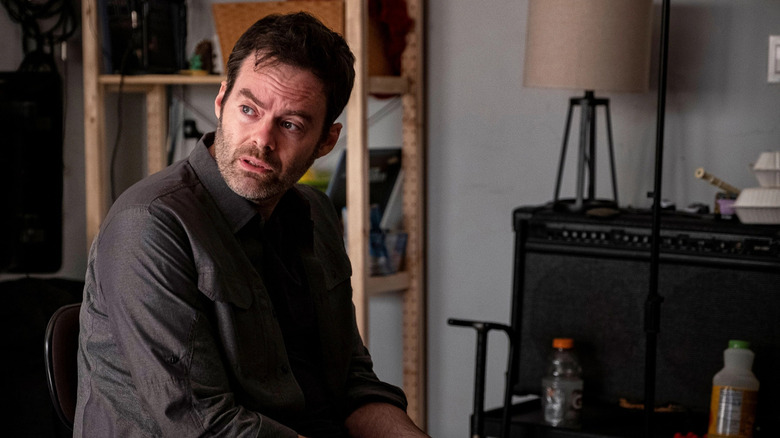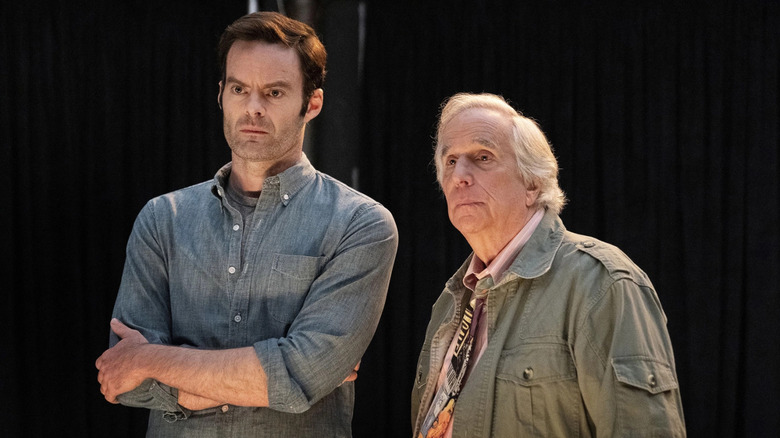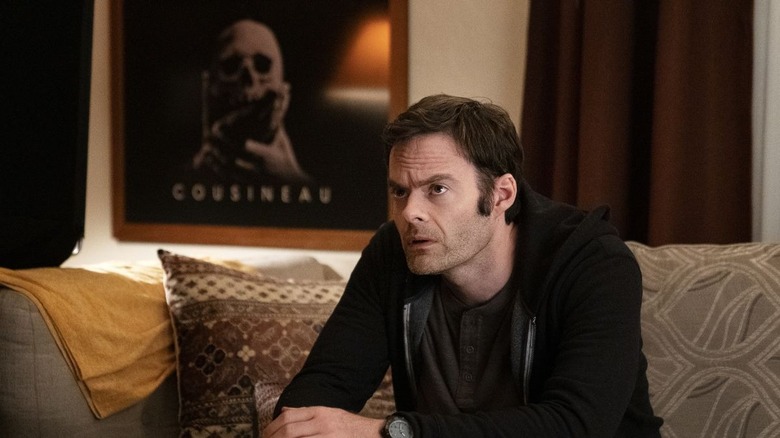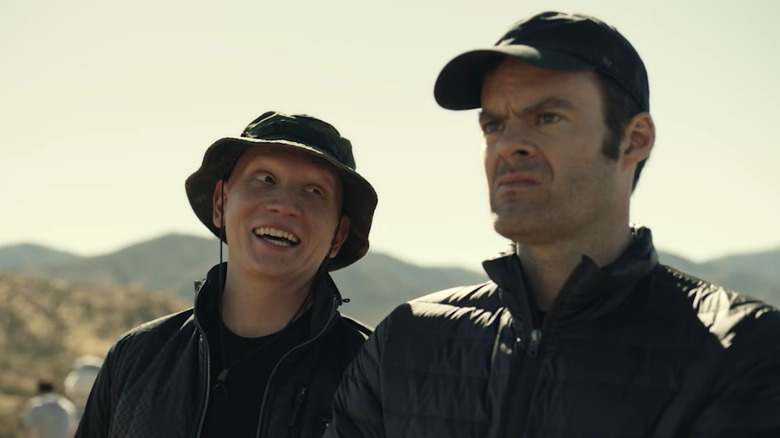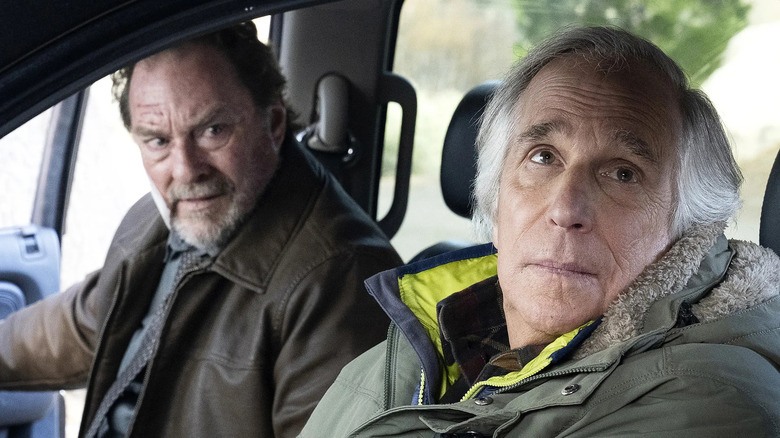Did Barry End Too Soon? An Investigation
This post contains spoilers for all of "Barry" and "Breaking Bad."
On an episode-to-episode basis, I loved "Barry" pretty much the whole way through. It was funny, sharp, and increasingly stressful, and I don't have any major problems with the way any character's story ended up. Barry Berkman (Bill Hader) being unceremoniously murdered by Gene Cousineau (Henry Winkler) makes perfect sense, just as it feels right for Sally Reed (Sarah Goldberg) to end up finding fulfillment as a small-time school acting teacher, no longer tortured by the desire to be a big star.
Yet the more I look back on the show, the more the ending feels a little hollow. I'm surprised by how little I felt when Barry finally kicked the bucket, or when NoHo Hank (Anthony Carrigan) died holding the statue of Cristobal's hand. Considering how invested I was in both these characters' arcs throughout most of the show, surely their final moments should've held a little more weight.
Most of all, it feels increasingly disappointing to realize that the central premise of the show — an assassin tries to make a career as an actor — is pretty much abandoned by the end of season 2. By season 3, the assassin part of Barry's character is overwhelmingly the main focus, and by season 4, Barry seems to have given up the idea altogether. Sally's Hollywood ambitions still haunt her years after she's given up on them, but you never get the sense that Barry still cares, or even remembers that being an actor was once a thing he'd wanted to do. Throughout season 4, fans speculated that the finale would at least feature a moment where Barry uses his acting skills to save the day somehow, but he doesn't.
The costs of bare-bones plotting
In the moment, the lack of acting for Barry in season 4 didn't feel like a huge deal. But looking at the whole series, it's hard not to feel a little disappointed. It's not that Barry doesn't succeed at acting — it's that he doesn't even come close, and he doesn't even try that hard. Throughout the first two seasons, we got to enjoy plenty of moments where Barry's assassin skills helped out his acting in fun, surprising ways. The natural, expected pay-off to this would be for his acting skills to unexpectedly translate to making him a better assassin in return.
You can make the case that his persona as a religious man in season 4 was acting, technically fulfilling the show's original promise. Barry tries to act like a good person without actually changing himself or taking responsibility in any meaningful way. That's some interesting thematic material, sure, but it's a lot less than what most viewers would've expected based on what the first two seasons established.
It's a shame too, because it feels like the show could have delivered more on Barry's acting while still keeping the same basic sequence of events we got. Fans and critics have often praised "Barry" for its supposed lack of filler — the show often accomplishes more character and plot development in a single scene than other shows pull off in entire episodes — but looking back at the show's four seasons, one wonders if the show should've given itself more time to breathe.
Imagining Barry's rise, before his fall
There's a period in season 3 where you can almost see the potential for Barry's acting career to take off. Barry had just made amends with Gene (well, sort of), and it finally seemed like Barry might've been in the clear. In a longer version of this show, this would've been the point where Barry gets his big break. His small role in "Laws of Humanity," not to mention the Variety piece about him, would've led to him getting a major role in a movie or film.
This development would've rubbed even more salt in Sally's wounds, as this was around the time "Joplin" got canceled thanks to the algorithm. It also would lead to Gene feeling more guilt about his decision to move past Barry's crimes and would motivate Fuches (Stephen Root) even more in his quest for revenge. Most importantly, it would provide an even stronger sense of stakes for when Barry's past finally does come to back haunt him. The season 3 finale was already pretty devastating, but what if it'd happened when Barry actually had a promising career ahead of him? What if he'd had even more to lose?
But season 3 doesn't allow itself time for this sort of thing, because even before Barry fixes things with Gene, Fuches is visiting the families of Barry's past victims to put them on his tail. The show probably could've done a nine or 10-episode season, one where Fuches' interference in Barry's life was postponed for one or two episodes so Barry could get a proper taste of acting success, but it didn't. '"Barry" season 3 never gives its main character a single moment of peace or stability, which isn't as smart of a choice as it sounds on paper.
The benefits of so-called filler
The term filler was originally used to refer to anime adaptations of manga, where the show would need to stall to avoid overtaking the source material. Today, it's come to refer to anything that doesn't clearly serve the immediate plot. Bottle episodes, departure episodes, subplots, character beats, it's all filler according to a large portion of most modern TV shows' fanbases. In recent years, the term's been watered down even more in fan forums, to refer to anything the viewer simply doesn't like.
This might be a side effect of the shortened seasons and more serialized format of modern TV: there's arguably less filler than ever, but because viewers are approaching shows more like 10-hour movies, they're less likely to appreciate those fun little detours that make TV so great in the first place. People complained about those one-off episodes of "Lost" where Hurley (Jorge Garcia) tried to get a van to work or Sawyer (Josh Holloway) lost a bet at ping pong, but there's something vital about giving viewers moments of respite where they can simply have fun and hang out with the characters.
Meanwhile in "Barry," when exactly were the good times fans can look back on? There was that time when Hank impotently tried to assassinate Barry early in season 2, or when Barry tried out a British accent while working with Sasha (Kirby Howell-Baptiste) at a department store. Those constant little moments with the rest of the acting class throughout the first two seasons did a ton of leg work creating a sense of normalcy. But beyond that, the status quo in "Barry" was constantly changing. And if everything's changing all the time, those changes start to lose their impact.
A lesson from a previous anti-hero series
As beloved as "Breaking Bad" was, those first four and a half seasons were plagued with one obvious, expected complaint: when was Walter White's DEA brother-in-law Hank Schrader (Dean Norris) going to find out about Walt's meth dealing? From the pilot, we knew this confrontation was inevitable, but the show waited for 54 episodes to finally deliver. The result was a gripping, devastating half-season where Walt's life collapsed before his eyes. To this day, "Ozymandias" is still considered one of the best TV episodes of all time, because it's the culmination of five seasons' worth of build-up. You can feel the sheer weight of that time in every single thing that happens.
Obviously, "Barry" was never required to follow those same plot developments — whereas "Breaking Bad" was comfortable in allowing parts of its audience to root for Walt (Bryan Cranston), warts and all, "Barry" has always been unambiguously clear that Barry's a bad person, and the viewers aren't really supposed to root for him. With that in mind, the shorter time spent on Barry's rise makes sense.
But while it's fitting that the HBO show chose to give Barry Berkman a far less dignified, far less climactic ending than Walt's, it's hard not to wish it had been a little more patient with the way it all unfolded. Sure, we can all think of a popular show that went on way too long for its own good, but "Barry" definitely overcorrected. As strong as the overall series still is, it stings to think of how much better it could've been if it hadn't been in such a rush to the finish line.
